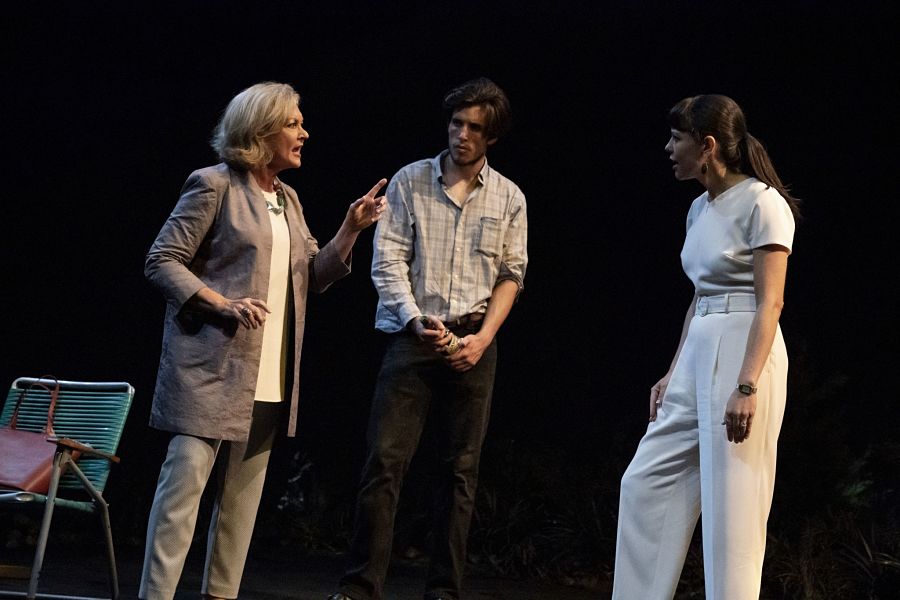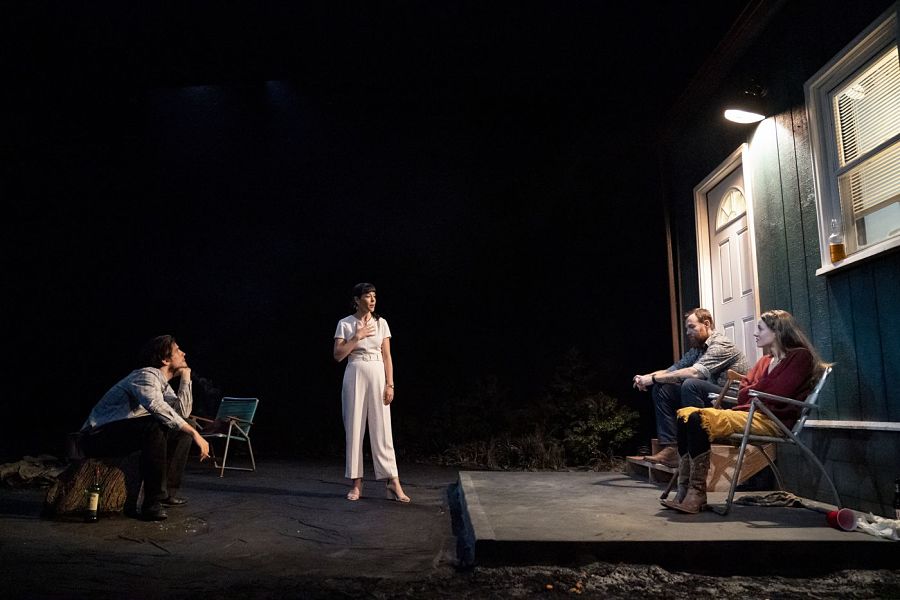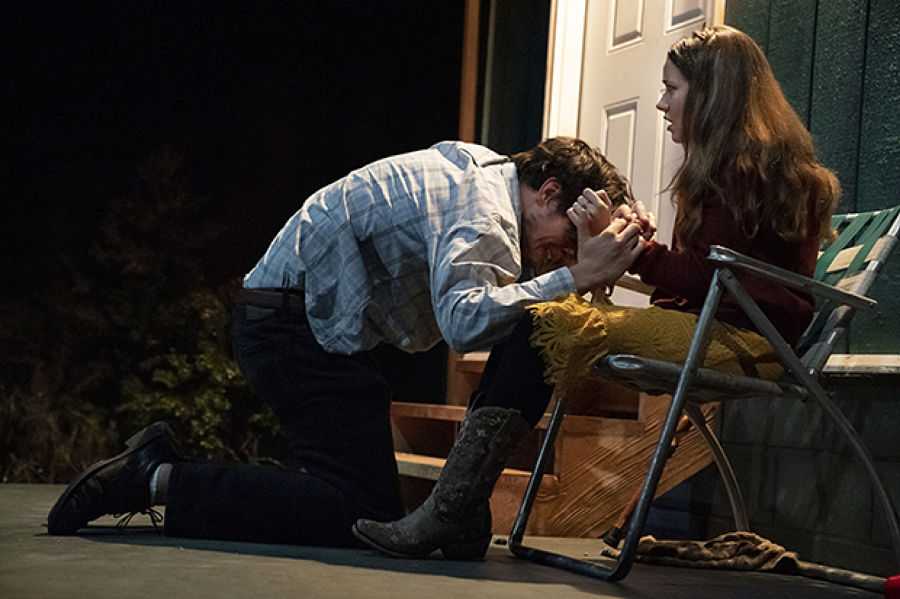In Will Arbery’s new play Heroes of the Fourth Turning, which appears in full in the March 2020 issue of American Theatre, five conservative Catholics in Wyoming gather late at night by a fire pit to argue, commiserate, and face the uncertain future of their faith and their country. Danya Taymor, who directed the world premiere production at New York City’s Playwrights Horizons last fall, talked to the playwright about his intentions and his hopes for the play.

DANYA TAYMOR: Was this play written in response to the election of Donald Trump?
WILL ARBERY: More than that, it was written in response to the response to the election of Donald Trump, especially here in New York. There was just a shock wave of bewilderment and destabilization— “How did this happen? What is this country? Who are we?” Because of the way I grew up, I felt that I had a responsibility to address some of those questions.
These characters come from your life and your experiences and the people that you grew up around. Can you talk about how they lived inside you, both before that election moment and afterwards?
Yeah. I had always wanted to write a play about the feeling of sitting in a dark backyard under the sky listening to really passionate, neurotic, inebriated Catholic conservatives hash it out. ’Cause that was a very, very familiar thing to me, from a very young age, like part of the stitching of my soul. I wanted to write about how I felt in those environments: absorbent and porous, but also paralyzed. Because I was just a boy, I sort of got used to not chiming in, just listening. That feeling of being a sponge in the dark is pretty close to the experience of being a theatre audience member. So it just felt right to try to capture that paralyzed-but-your-brain-is-spinning feeling.
A question that we heard a lot about the play is, “Why is there no liberal character—like, why did you let this group of Catholic conservatives exist unchallenged by a liberal voice?”
The idea of the play, the central provocation, was to not have that safety net. It probably came from taste—I had seen so many plays that made their politics really clear, or had characters standing in for the author, and I just felt like that was a recipe for forgetting the art. That applied not only to plays that ended with calls to action, but also to plays that ended on a clear question. Even if it was left unresolved, if I could articulate the question, I still found that to be a recipe for forgetting. Which is not to say that I wanted to create something nihilistic or apolitical in response. I wanted to create an experience that was engaging people in a very citizen-based way, but where they left not even knowing the question, let alone the answer. Because I think that’s much more true to what it can feel like to live in this country.
What do you think made people yearn for that other voice, though?
I can’t really speak for them, but I think it might be a discomfort with the play’s POV—the way it lives in an in-between space that is equal parts pain and love. That is not an easily articulable place. And our society is really structured around endless articulation of a divide, and this symbiotic relationship between these sides that hate each other, always articulating and confirming that hatred and that rift. To wade into that rift, and muck around there, and to find a certain level of beauty and joy in that—and also shared pain—I think we don’t want to linger there. Things become more confusing there, and they go beyond language. I think ultimately what frustrated people was that they themselves were not able to find the language for how the play made them feel. And many plays will send you off with that language.
One of the last things Emily, who suffers from chronic illness, says in the play is, “I love pain. I love it.” Can you talk a little bit more about pain, both in the physical realm and beyond, and how it courses through both this play and all your work?
A lot of that honestly comes from growing up in the household that I did, and being raised by eight women. From where I’m sitting, it seems to me that the Catholic Church and the conservative movement, and society in general, demand a tremendous amount from women’s bodies. Far more than is demanded from me. But beyond that—I mean, the central image of the Catholic faith is of a man being crucified. Pain is the whole thing. And beyond even that, I think all of us, as devourers of stories, are sustained by depictions of pain.
How do you feel when people want to dig into your own particular relationship to politics or Catholicism or to God? I know a lot of people came up to you afterwards and were like, “Are you praying?”
I think that’s similar to the liberal theatregoer wanting there to be a liberal character they can latch onto who will sort of speak for them. There’s an understandable itch to confirm that the author’s on their side, basically: “Am I allowed to like this art?” For a religious conservative: “Is this pagan art, with coded condemnation or ridicule of us?” For a progressive: “Is this reactionary art?” Maybe there’s an idea that the playwright’s own beliefs will help everyone come to a thesis. Which really led me to the question: What is a belief? What is an opinion? What is gained from me saying, “Don’t worry, I’m on your side”? We’re moving through the world with this uneasy sense that there are people out to get us. I think this play taps into that in some way, but also creates a bridge of listening and hopefully love. And that love, for some people, increases the uneasiness. It’s mysterious and irrational. But in that space, we encounter ourselves. We transcend politics, opinions, even language. Yeah, at a certain point it became very clear that, as the artist, I needed to avoid giving anyone the satisfaction of knowing that I was 100 percent on their side—that they needed to encounter the play on their own terms.
I think part of the reason maybe why people wanted to know that is because of how potent and concentrated the play is. I was reading an interview that Hilton Als did with Branden Jacobs-Jenkins, and Branden was talking about his own relationship to this kind of question in the context of adapting An Octoroon. And he said, “Our instinct is to read an author’s politics into the work, but the thrust of that play is that theatre is a self-contained illusion, a mirror trick. A play has its own politics, but that doesn’t necessarily mean the author should or does share them.” Do you agree with that? Is that useful at all in thinking about this play or the act of writing this play?
That’s very close to how I feel. Necessarily, though, there will end up being cracks in the mirror. My dad loves this quote from Keats: “A poet is the least poetical of anything in existence because he has no identity. He is constantly informing and filling some other body.” That has haunted me, because as much as I would like that to be true—as much I would like to not have no identity—I know that I very much do, and that it has a very real effect on people, and no matter how silent I make my own voice in the play, it’s impossible to remove that entirely. And that’s okay.

The climax of the play centers around an ideological clash between two women of different generations. Gina, who came up as a Goldwater girl and a Pat Buchanan supporter, says that she stomached a vote for Trump because, as she says, Catholics are called to be single-issue voters. Teresa, a hyper-articulate 29-year-old Bannon devotee, confronts Gina and tries to get her to own the fact that her single issue is actually Western civilization, not a pro-life agenda. What were you trying to expose around whiteness in the scene? And why is the generational conflict at the center of the scene inextricably tied to this ideological one?
One of the things that we talked about in rehearsal with Zoe, who played Teresa, was how complicated Teresa’s rhetoric had become because she had immersed herself in so much progressive writing. I think she’s read a lot of Black writers and has made herself intimately familiar with where the left at its most radical is going. So when she’s talking, it’s really hard to parse out the difference between what she actually believes and what she’s trying to demonstrate to Gina as “the new thinking.” And we discover that rather than ignore new trends on the left, Teresa has incorporated them into her beliefs on the right. Gina has bad-mouthed Bannon and thinks these new far-right thinkers are stupid and that they don’t know what’s going on, and Teresa is like, no, they’re responding to how things actually are, they’re navigating it in the only way we can, otherwise we’ll lose.
And in that way, to Gina, Teresa starts sounding like a radical. Gina keeps saying, “You’re one of them. Who is this in front of me? I don’t recognize you.” That gap, that absence, that fugue seems to be like an active part of Teresa’s daily life and way of seeing. And I think that because of the work Teresa has done, she is forcing a conversation about whiteness that usually doesn’t happen in cloistered conservative spaces. And that’s the reason this debate is situated where it is in the play, because it gives it that “why this night” quality. The rest of the debates might come up at any gathering like this, especially in a fraught political time. But somebody actively saying, in these conservative academic circles, that we need to embrace our identity as white Christians and talk publicly about that and hit back at them with equal vitriol that they’re giving to us—that just doesn’t happen very often, especially with older, more traditional conservatives present. You might see a pundit flirting with stuff like that, and the dog-whistles and codes are certainly baked into the entire discourse. But usually it just stays at that level: codes. Often even unconscious codes. So it was this really, really tricky thing of having to believably force a conversation that wouldn’t normally happen.
And I think the reason it’s ultimately hopefully believable is that there are people out there like Teresa who are forcing those conversations now. As we were working on the play, we started to see new essays coming out, like the Sohrab Ahmari/David French debate, which is really about whether the culture war is already happening and whether we need to just embrace the fact that America is a Christian nation and legislate accordingly. And so Teresa is more on the side of things where she’s just calling it what it is and not trying not to use coded speech—just owning it, because she feels like it’s gotten to that point.
Would you say that part of what that scene is doing is exposing that though the rhetoric comes out of Teresa in one way and comes out of Gina in a different way, they are essentially the same?
I mean, that’s tricky. I think Gina is a really complicated character. As with any conversation in or around this play, it’s just as much about what they don’t say as what they do, what they don’t object to as what they do. I think that if you go through and do a really close analysis of Gina’s responses in that scene, you can see why Teresa’s getting so worked up, because a lot of what Gina is not contradicting is ultimately fuel for Teresa’s point. But I think Gina has plenty of reasons to be frustrated as well. I don’t know if they’re essentially the same, because their debate is more than anything about how to exist in society as a conservative, how to behave oneself and what words to use. And Teresa is trying to get Gina to admit to a motive, a core of belief, which Gina won’t acknowledge. She defers to God. And that’s hard for Teresa to rebuff.
At the beginning of the play is a prologue without text, just a man, the land, a deer, and the darkest light of morning. Why did it feel important to start a play with silence before people go on to talk nonstop for two hours?
I don’t really know if I can put words to it, but it just felt really important. We talked in rehearsal about “the event of silence.” We talked about the land, and prayer, and sacrifice. Also I think seeing an animal is really important because of the way that I think about the language in this play in particular. I’m not a person who debates or tries to make debates happen when I’m with my friends, but I’ve witnessed oh-so-many, both in person and constantly on the news, and I was really interested in the animal nature of it—what we, as human animals, are doing to each other, and to our own bodies, when we talk and talk and talk and try to reach a consensus on the best way forward. Just what is that animal need, that human animal need? So stripping away all of that at the beginning, experiencing the silence and then this incredibly loud gunshot, and then witnessing this other animal’s body, feeling somehow complicit in its death… I don’t know. My words are running out. It just felt really important.
In her American Theatre interview, the playwright Antoinette Nwandu asked, “Where are the white artists who are grappling with their own whiteness?” Is this part of what you’ve set out to do with Heroes, and on a larger scale with all of your work?
Yes, that’s very much what I’ve set out to do. I’m suspicious of the phrase “race play” as it’s normally used, but I would be thrilled if people called Heroes a race play. This is a play about whiteness and the way it works in a particular pocket of America. Or that’s part of what it’s trying to do. And in the past few years I’ve made the decision to vivisect my own whiteness. To push into uncomfortable places. To make my own whiteness squirm. I was inspired by the work of Claudia Rankine and her Racial Imaginary Institute. This involves asking myself what it means that I was born white in this country, what privileges and paranoias I inherited, but it also involves creating language to fill an absence. So much, these days, is overly articulated, especially our polarization and hatred. But clear writing about whiteness, from inside it, is weirdly rare. There’s a fortified inarticulation around whiteness in America, a defensiveness. A feeling of: “We don’t talk about those things, not in those terms.” So I think I’ll be writing about it forever.

You said that one of your goals with Heroes was to move past empathy into the territory of love. Hannah Arendt talks about how compassion is dangerous because, not unlike love, it abolishes the distance, the in-between, which always exists in human intercourse. Do you think the real provocation of Heroes lies in its ability to shatter that distance?
I hope so. Yeah.
So why love? It’s a word you kept coming back to over and over again. And I think it’s a surprising word for some people, especially people who find some of the things that your characters say hateful. Can you talk about that as a present and provocative force in the play?
I mean, I think love is always provocative, and it’s maybe not necessarily always unpopular, but it certainly is right now. I hope love becomes popular again soon, but sometimes, like the play mentions, it takes a crisis for that to happen. One thing I found really interesting, we had a fair amount of walkouts with this play, and they almost always occurred during the section of the play I would consider the most loving and most free of conflict, the section that has the most freely acknowledged belief in God and God’s presence—it was around the time of wanting to pray the rosary. It’s Emily’s section, and Teresa’s not there. I think there’s something delicious about Teresa—she crackles, and forces these hard conversations, and it’s a you-love-to-hate-her kind of thing, you know? Emily’s section was the total opposite, and it made people viscerally uncomfortable.
It’s also tricky, because I didn’t just want to make a play that was like, “Conservatives are people too,” or, “People from Wyoming can be smart.” It’s more like: Let’s just go to this place and breathe with these people. I’m much more interested in forms of love. And when I’m using “love,” it’s an action I’m talking about. It’s an endlessly complex and painful and confusing action, and it is so often textured with the things you don’t like about someone or things they say that you find repulsive. We all have those people in our lives who just don’t fit into a box. It’s never just: “I love this person because they believe all the same things I do.” Love is much more primal and mysterious and provocative.
You’ve said to me that every play you write is a ghost story. How does Heroes reveal itself as a ghost story, and what are you investigating at this intersection of the rational plane and the invisible world?
You know, Catholicism, like a lot of religions, is structured around a mystery—that’s what faith is, the confrontation with terrifying mystery and choosing to believe. And yet a lot of Catholics have words for all of these mysteries, they have boxes for them. Categories. And some religious conservatives interpreted certain elements of the play as being “the demonic,” and they would sort of snarkily say, “It’s an inaccurate representation of the demonic, but that’s clearly what’s happening.” It’s like, no. What there is in this play is a sense of the unknowable. There is a loud mystery, there’s a quiet mystery, and there’s everything in between.
There’s a lot in this play that seems to be on a rational plane, but because of that, its engagement with the invisible world and the unknowable plane is so much more important. I think that’s why a lot of people wanted to know what I believed or what the play was ultimately “saying.” We’re desperately trying to get to a truth that we can all agree on, then we’ll have that forever and we’ll be okay. But I guess what the play is proposing is that we all meet in that unknowable place, beyond all words. And what happens then?


